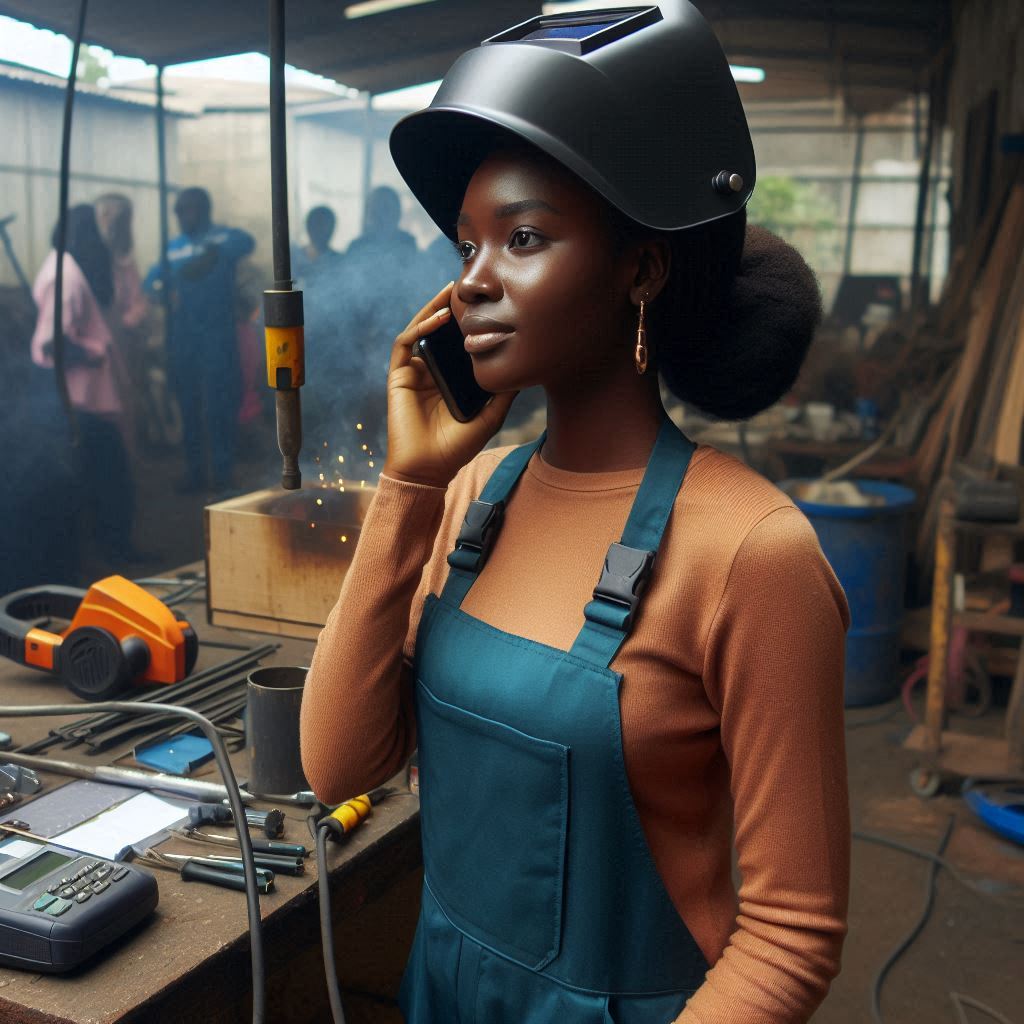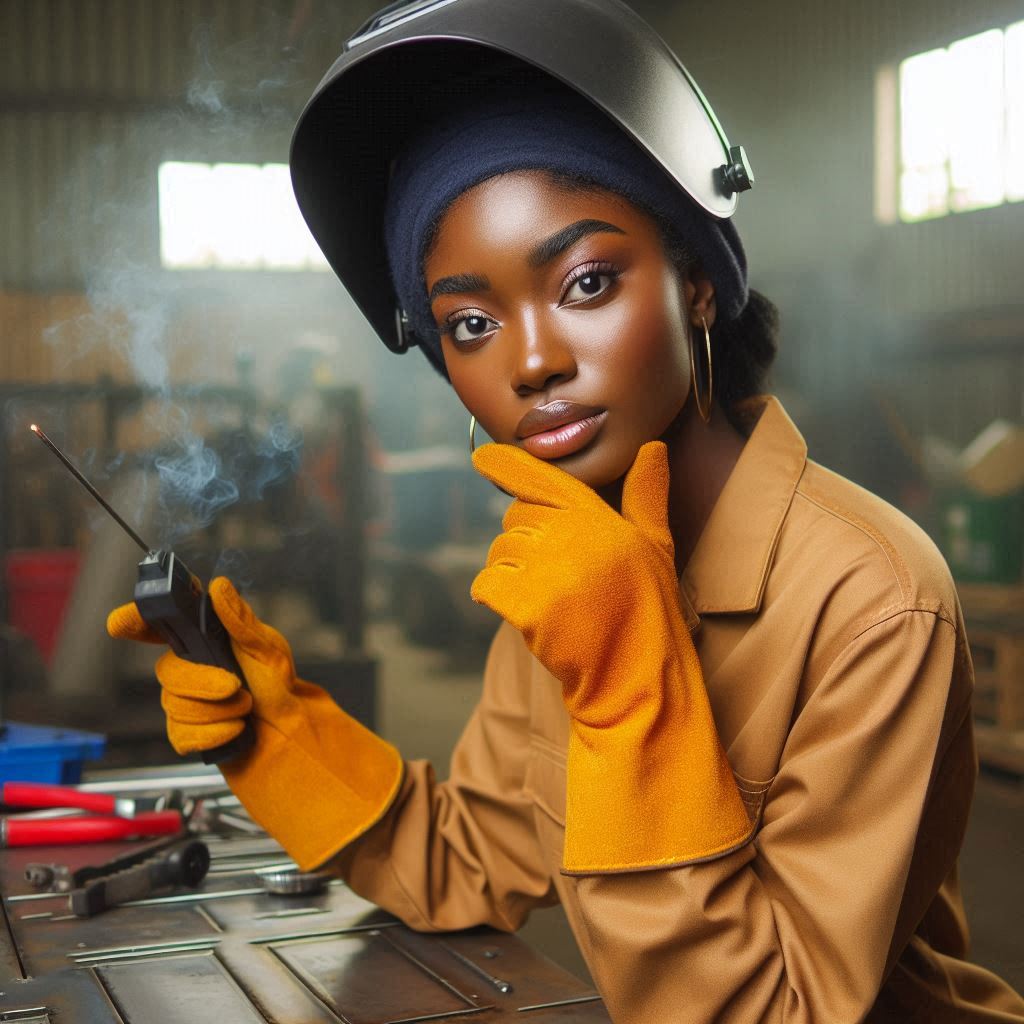Introduction
Welding is a vital profession in Nigeria, contributing significantly to the country’s infrastructure and industrial growth. Traditionally, welding has been male-dominated, with few women entering the field.
However, the landscape is changing as more women take up welding, challenging stereotypes and breaking barriers. The role of women in welding in Nigeria is gaining prominence as they pursue careers in this technical field.
Nigerian women are increasingly enrolling in welding programs, obtaining certifications, and demonstrating exceptional skills and dedication. They are proving that gender does not define one’s ability to excel in technical professions.
Essentially, the role of women in welding in Nigeria is evolving, with more women breaking into this traditionally male-dominated field. Their contributions are vital for the growth and innovation of the industry.
By challenging stereotypes and showcasing their skills, Nigerian women in welding are paving the way for future generations and promoting a more inclusive and diverse workforce.
Their achievements highlight the importance of supporting and encouraging women to pursue careers in technical professions, ultimately benefiting the entire welding industry in Nigeria.
History of Women in Welding in Nigeria
Women have been part of the welding industry in Nigeria for decades, although their numbers have been significantly lower compared to men. Traditionally, welding was viewed as a male-dominated profession, and women faced numerous barriers when trying to enter the field.
Despite these challenges, there have always been pioneering women who defied stereotypes and societal norms to pursue careers in welding. These women have played a crucial role in paving the way for future generations of female welders in Nigeria.
Challenges Faced by Women Entering the Welding Industry
- Lack of access to training and education in welding.
- Gender stereotypes and discrimination in the workplace.
- Inadequate support and mentorship for women in welding.
- Physical demands of the job that are perceived as challenging for women.
- Limited opportunities for career advancement and growth.
These challenges have deterred many women from pursuing careers in welding, leading to a significant gender gap in the industry.
However, with increased awareness and advocacy for gender equality, there is a growing movement to empower women in welding and provide them with the support they need to succeed.
Success Stories of Women Welders in Nigeria
- Casey Eze, a renowned female welder in Nigeria, has broken barriers and stereotypes in the industry.
- Grace Adeola, another inspirational figure, has built a successful welding business from the ground up.
- Lilian Okoro has excelled in underwater welding, a challenging and specialized field within welding.
- Amara Nwosu has become a role model for young women interested in pursuing careers in welding.
- Chidinma Okeke has won accolades and awards for her exceptional welding skills and craftsmanship.
These success stories highlight the resilience, determination, and talent of women welders in Nigeria. By showcasing their achievements and contributions to the industry, these women are inspiring the next generation of female welders to pursue their passion and excel in welding.
Read: Agricultural Engineering vs. Other Engineering Fields
Training and Education Opportunities for Women in Welding
As more women express interest in pursuing careers in welding, various training and education opportunities have emerged to support and empower them in the field. Here are some avenues through which women can acquire the necessary skills and knowledge:
Vocational Schools and Technical Training Programs
- Many vocational schools and technical institutes offer comprehensive welding programs specifically designed for women.
- These programs provide hands-on training in various welding techniques, safety protocols, and equipment operation.
- Women seeking to enter the welding industry can enroll in these programs to gain practical experience and expertise.
- By completing vocational training, women can acquire industry-recognized certifications that boost their employability in the welding sector.
Scholarships and Grants Aimed at Encouraging Women to Pursue Welding
- Several organizations and institutions provide scholarships and grants exclusively for women interested in welding.
- These financial aid opportunities aim to reduce barriers to entry for women and promote gender diversity in the welding profession.
- Women can apply for these scholarships to cover tuition fees, training materials, and certification exams related to welding education.
- By receiving financial support, women can pursue their passion for welding without being hindered by economic constraints.
Overall, the availability of vocational schools, technical training programs, scholarships, and grants for women in welding underscores the growing recognition of women’s contributions to the field.
These resources play a crucial role in empowering women to pursue successful welding careers and shatter gender stereotypes in a traditionally male-dominated industry.
Read: How to Start a Career in Agricultural Engineering
Support Networks for Women Welders in Nigeria
Women-focused organizations and associations in the welding industry
Several women-focused organizations and associations in Nigeria are championing the cause of women in the welding industry. These groups provide essential support and resources to help women navigate and excel in this traditionally male-dominated field.
Organizations such as the Nigerian Women Welding Association (NWWA) are at the forefront, advocating for gender equality and professional growth.
NWWA focuses on empowering women by providing access to specialized training, resources, and networking opportunities. They aim to bridge the gender gap in welding by promoting women’s participation and success.
NWWA organizes workshops, seminars, and conferences to enhance members’ skills and knowledge, ensuring they stay competitive in the industry.
Another key player is the Women in Welding Nigeria (WIWN) initiative. WIWN works closely with educational institutions and industry leaders to create a supportive environment for women welders.
They offer scholarships, grants, and sponsorships to women pursuing welding courses, helping to alleviate financial barriers and encourage more women to join the profession.
Mentorship programs for women starting out in welding
Mentorship programs are vital for women starting their careers in welding. These programs provide guidance, support, and encouragement, helping women to overcome challenges and achieve success.
Both NWWA and WIWN have established robust mentorship programs to assist women at various stages of their welding careers.
Mentorship programs pair experienced welders with newcomers, creating a supportive and learning-rich environment.
These relationships help mentees gain practical knowledge, industry insights, and confidence. Mentors share their experiences, offer advice, and help mentees navigate the complexities of the welding industry.
These mentorship programs also focus on personal development, including building leadership skills, improving communication, and fostering resilience. Mentees benefit from tailored guidance, which helps them to set and achieve career goals.
By fostering strong mentor-mentee relationships, these programs create a sense of community and belonging among women welders.
The impact of mentorship programs extends beyond individual growth. They contribute to a more inclusive and diverse welding industry by breaking down barriers and challenging stereotypes. As more women succeed in welding, they become role models, inspiring the next generation to pursue careers in this field.
In addition to mentorship, these organizations advocate for policy changes to support females welders. They work with industry stakeholders to create a more equitable work environment, ensuring that women have equal opportunities for advancement.
By promoting policies that address gender discrimination and support work-life balance, these organizations help to create a more supportive industry for all.
Generally, women-focused organizations and mentorship programs are crucial for the advancement of women in Nigeria’s welding industry. By providing training, resources, and guidance, these initiatives empower women to succeed and thrive.
The efforts of NWWA and WIWN, along with their mentorship programs, are transforming the welding industry, making it more inclusive and diverse. As more women join and excel in welding, they pave the way for future generations, fostering a more equitable and dynamic industry.
Read: Top Universities for Agricultural Engineering in Nigeria

Benefits of having women in the welding industry
When it comes to the welding industry, having women participate brings a multitude of benefits that go beyond just gender equality.
Here are some of the key advantages:
Diverse perspectives and approaches to problem-solving
- Women bring unique perspectives and experiences to the table when it comes to tackling welding challenges.
- Having diverse problem-solving approaches can lead to more innovative solutions in the welding industry.
- Women often have a different way of thinking and can offer fresh ideas that enhance project outcomes.
- By incorporating women’s viewpoints, companies can achieve a more holistic and comprehensive approach to welding projects.
Increased representation and empowerment for women in non-traditional roles
- When women are encouraged to enter the welding industry, it sends a powerful message about gender equality and inclusivity.
- Having more women welders can break stereotypes and show that women are capable of excelling in non-traditional roles.
- Empowering women to pursue careers in welding can lead to increased confidence and self-esteem among female workers.
- By promoting diversity and inclusion, companies can create a more welcoming and supportive environment for all employees.
Therefore, the benefits of having women in the welding industry are clear. From diverse perspectives to increased empowerment, women bring valuable contributions that can drive innovation and success in this traditionally male-dominated field.
It is essential for companies to promote gender equality and embrace the talents and skills that women can offer in welding roles.
Read: Entrepreneurial Opportunities in Agricultural Engineering
Challenges and Barriers Faced by Women in Welding
When it comes to females welders, there are still numerous challenges and barriers that they face in the field. These obstacles often hinder their progress and success in a predominantly male-dominated industry.
Gender Discrimination and Stereotypes in the Workplace
- Females welders often face gender discrimination and stereotypes in the workplace, which can make it difficult for them to be taken seriously by their male colleagues.
- There is a perception that welding is a masculine profession, leading to bias against women who enter the field.
- Female welders are sometimes subjected to exclusion, harassment, or unequal treatment simply because of their gender.
Lack of Access to Opportunities and Resources Compared to Men in the Field
- Females welders often have limited access to training programs, apprenticeships, and job opportunities compared to their male counterparts.
- Many women face challenges in accessing resources such as welding equipment, protective gear, or even employment opportunities in the field.
- There is a lack of support systems and networks specifically designed to help females welders succeed and thrive in their careers.
- Women may also encounter barriers in terms of promotions, pay equality, and career advancement opportunities within the welding industry.
Most Importantly, it is crucial to address these challenges and barriers faced by females welders to promote gender equality and diversity in the field.
By breaking down stereotypes, providing equal opportunities, and creating supportive environments, we can empower women to excel in welding and other male-dominated industries.
Conclusion
The participation of females welders is pivotal for fostering diversity, innovation, and sustainable growth in Nigeria’s industrial landscape. Women bring unique perspectives, skills, and contributions that enrich the welding profession and drive industry progress.
Recapping the importance of women’s involvement in welding underscores their role in enhancing workplace dynamics through diversity.
Their presence not only promotes inclusivity but also inspires future generations of women to pursue careers in traditionally male-dominated fields.
A compelling call to action urges stakeholders to prioritize gender equality and empowerment initiatives within the welding industry.
It is essential to support and expand existing programs that provide training, mentorship, and career development opportunities tailored to women welders.
By investing in these initiatives, we can create a more equitable environment where women thrive, contribute significantly to economic development, and shape the future of Nigeria’s industrial sector.
In closing, promoting women’s participation in welding is not just about achieving gender balance but also about harnessing untapped potential and driving innovation.
Together, we can build a more inclusive and progressive welding industry that benefits society as a whole.




